Monsters-of-the-Week
Episodes: “Triangle”, “How The Ghosts Stole Christmas”, “The Unnatural”
There were a great many standout episodes this season, but the good ones were SO good they almost deserve a recap in themselves. For that, I’ll single out my favourite three (I reallyyyy wanted to do “Agua Mala” too) and go into as much detail as my editor’s discretion allows.
“Triangle”
This could so easily have been the episode of the season—and it is a high point, for both season and show—but “How the Ghosts Stole Christmas” just pips it to the post. Mulder hears that the Queen Anne, a legendary ghost ship, has reappeared somewhere in the Bermuda Triangle and charters a boat out to the middle of the Atlantic to find it. Alone, of course. He’s hauled aboard the ship and finds the passengers stuck in a time warp from the Second World War. The English crew (replete with awful oo-ar pirate accents) immediately assume he’s a German spy. Shortly thereafter, actual Germans capture the ship and also assume he’s a spy. The Nazi officers look like Spender and the CSM and—hilariously—Walter, going undercover in a direct parallel to his present-day role as our heroes’ unofficial guardian. The Germans are looking for a weapon codenamed “Thor’s Hammer” and the scientist who created it is on board. A 1940s-era Scully has been assigned to protect him and she is MAGISTERIAL, laden with gumption, and offers to show Mulder the “stars on the American flag” (by punching him) when he approaches her. [hoses self]
In present-day DC, the Lone Gunmen alert Scully to Mulder’s disappearance. In a labyrinthine sequence of brilliance, she flies around FBI HQ demanding favours and intel from both Skinner and Spender. The latter she attacks with the brilliant line, “I need a favour, it’s non-negotiable, you either do it or kill you”, while Skinner gets an actual kiss on the lips for his troubles. I can’t keep up with her magnificence in this sequence and I’d be here all day if I tried to do it justice, so I’ll embed the best part.
Skinner’s info gets her and the Lone Gunmen out to the Queen Anne and the episode goes split-screen, showing us 1940s Scully and Mulder running from the Germans while her latter-day counterpart searches for him. In the course of the 1940s chase, undercover Nazi Skinner shoots some German officers and tells our heroes, in his finest German accent, “God bless America. Now get your asses out of here.” They reach the deck and Mulder stops. He urges Scully to get the ship out of the Bermuda Triangle and, just in case she doesn’t succeed and he’s deleted from existence, he kisses her. This earns him a punch on the cheek so he jumps overboard. Hearts have exploded over less.
In the present day, 90s Scully fishes Mulder out of the water. There’s a lovely Wizard of Oz-style sequence in the hospital when he wakes to find the Lone Gunmen and Skinner at his bedside. After the others leave, Mulder tells Scully he loves her. She goes one better than Audrey Hepburn in Breakfast at Tiffany’s and replies “oh, brother” before wandering off. But wait! As Mulder, slightly dejected, settles down to go back to sleep, he rubs his cheek and discovers it’s bruised from where she punched him. The whole thing really happened! The kiss, the declaration of love, all the madcap antics and the trembling of our fragile shipper hearts. Pour one out for star-crossed lovers everywhere.
“Triangle” was notable for one simple reason: it’s a masterpiece. A breathtaking detour into fun and frolics, it manages to highlight so many of our heroes’ defining traits and lets Mulder overtly declare his love ages before Scully’s feelings are made similarly clear. The Dana we know, perennially married to integrity and professional decorum, finally gets to read her colleagues the riot act while her 1940s self saves the world in curls and a sleek red dress. It moves so fast you might miss it but make no mistake, this is a gorgeous paean to Scully’s resolve, moral courage, calm under pressure, and (yes!) gumption.
For an episode centred around a time warp, there’s an almost nonsensical simplicity to the way events and characters are depicted. Making the CSM and his minions the Nazis is ridiculously on-the-nose and yet, it speaks to both his Machiavellian ways and Spender’s misguided ignorance. The 1940s setting allows them to replicate the directness of a narrative from that era. Instead of an in-depth look at the murkiness of wartime morality, we get heroes and villains, snappy pacing, bubbling comedic action and ludicrously OTT subplots (the English sailors’ Jamaican shipmates rise up against racism and a brawl spontaneously erupts as the Germans try to interrogate Mulder). It means the latter-day snippets can be similarly light-hearted, moving just as quickly and giddily and eagerly embracing all the comedic implications.
Indeed, the whole thing is so bright and gooey you barely notice the long-term fallout: Mulder declaring his love for Scully, in a moment that’s played for laughter as an obvious deflection from how completely cute it is. It feels like the perfect moment for him to voice his feelings precisely because it’s so off-kilter, matching his often ridiculous persona as well as the inanity of the journey they’ve been on for five years.
This, my friends, is the greatest timeline.
“How the Ghosts Stole Christmas”
Honestly, where else would Mulder be on Christmas Eve but outside an old, reportedly haunted house in Maryland? I love Christmas, and I love haunted houses, and the intersection of the two yields what’s easily one of my favourite episodes thus far.
Twas the night before Christmas, and our heroes trek into a quintessential haunted house: wooden panelling, open fireplace, cobwebs aplenty, spooky noises, and brick walls which appear of their own volition. They find two bodies wearing replicas of the exact clothes they’re both wearing and for some godforsaken reason, Scully decides they should split up. They end up encountering two charmingly sadistic ghosts (played with relish by Lily Tomlin and Ed Asner) and get a free lecture in how completely fudged their co-dependent lives are.
The male half of this ghostly couple talks psychology. He tells Mulder he’s a narcissistic lunatic pursuing an obvious fallacy in an attempt to stave off his crippling loneliness. The female ghost takes a similar approach with Scully, saying she feels empty and aimless and, despite all wisdom to the contrary, sticks with Mulder so she can derive purpose and meaning from proving him wrong. It’s almost grimly blunt but absolutely hilarious—a terrific inversion of the cautionary ghosts of A Christmas Carol and their attempts to convince Scrooge to change his ways.
The episode culminates, after much befuddling, trickery and thunder crashes, in Mulder and Scully shooting one another to escape the madness of their supposedly meaningless lives. Quoth Mulder, gun in hand, Christmas is about nothing but loneliness. They crawl outside, covered in blood, when Mulder suddenly realises with one of his characteristically miraculous brainwaves that the whole thing’s a trick. He tells Scully as much, although she’s looking for her gun to shoot him again. They stand up, step out the door and bolt when the blood evaporates.
The episode then cuts back to the ghosts, reclining happily in easy chairs in front of the fire. They hold hands as the clock strikes twelve and lament the “two such lonely souls” they’ve just been entertaining. The holiday season is about love, they say, and at least they understand that. Like clockwork, back in DC, our heroes meet at Mulder’s apartment. After a hurriedly-issued disclaimer that they didn’t experience anything in the haunted house but a psychological projection of their innermost, darkest fears, gifts are swapped and smiles exchanged. Love, was it? I wish it was Christmas.
Goddamn if I don’t love how completely *twisted* this whole episode is. It mines phenomenal humour from an incredibly bleak experience. Our heroes essentially step through a looking glass, the haunted house holding up an unflattering mirror and forcing them to confront the ghosts lurking in their hearts and minds. The fact it’s set at Christmas underlines the grimness of events—while many people enjoy quality time with loved ones, these two have nothing better to do than investigate an abandoned house. It’s implied that Mulder takes Scully’s car keys to force her to go inside with him (I don’t think he did) but the fact remains that she’s willing to let herself be led.
The ghosts bluntly lay out everything that’s causing them doubt. Mulder’s need to feel like he’s chasing some higher purpose in life is well-documented, as is Scully’s unease over her decision to continue working with the FBI. But the ghosts make them face these fears as they pertain to *each other*—as much as they’ve brought joy and fulfilment to one another’s lives, they’ve also held each other back, and the fear of getting trapped in a moot, self-perpetuating cycle is tangible.
The darkness of this episode gets a little unsettling if you really dwell on it. The ghosts try to convince Scully that Mulder’s drawn her there to kill her, having finally decided to end it all and intent on bringing her down with him. They also persuade Mulder that if his life’s quest truly is meaningless, what else can he do but put himself and his partner out of their communal misery? The implications of this are unpleasant—violence against women especially—but it means the episode is indeed a horror befitting its setting. It maps out the seedy underbelly of a partnership as insular and isolating as that which our heroes share, and some of their darker fears about where it might lead.
I loved the design of this episode. The house is so exquisitely sinister and atmospheric and every clap of thunder made me want to cheer. I also love that it actually let our heroes get angry at each other. They’ve come to verbal blows several times, but when you work so closely with someone for so long resentments are bound to arise and these have to bubble over at some point. I’d rather it didn’t ever end in bloodshed, but you could interpret it as a nightmare—a heightened, largely inexplicable experience which lets the characters live out their darker impulses before reverting to the norm.
Good job the next standout episode is so earnest, eh?
“The Unnatural”
This was just … sublime. In every way. Of all the things I expected to enrapture me when I started this show, I didn’t expect it to be Duchovny’s clear sensitivity and intelligence. He wrote and directed this and poured so much sincere, heartfelt emotion into every frame I’m getting teary just thinking about it.
Here’s how you know this one is magic: I keep forgetting Mulder and Scully are even in it. They’re utterly peripheral to proceedings, bookending the episode with some delightful scenes but otherwise barely involved. All of this episode’s charm stems from a fairytale-like flashback to yesteryear, as Arthur Dales’ brother recounts the story of how his brother met a baseball-playing alien.
In what is surely a meta commentary on this show’s complete inability to think of new character names, Arthur Dales’ brother is also called Arthur. Dales himself is in Miami (as we saw in the terrific “Agua Mala”) so his brother relates the story of Josh Exley, a black baseball player, who became a target of the KKK in 1940s Roswell. The young Dales was assigned to protect him and they soon become firm friends. Exley is a prodigious talent who’s never been scouted to the major leagues because of his race, but there’s more to him than meets the eye. After he gets a knock in the head, Dales notices that his blood is green. He falls asleep on the team bus and his reflection is that of an alien. After hearing strange noises in Exley’s room one night, Dales bursts in and discovers the man is actually a bona fide extra-terrestrial.
Exley explains that he came to Earth with a fellow band of aliens. Their society forbids interaction with humans, but when Exley discovered baseball he deserted his kind and took on the identity of a missing boy. He says that his alien brethren never laugh or smile, whereas for him baseball provides a delight he simply can’t ignore.
Alas, desertion of the alien colony is a crime punishable by death, and Exley has a bounty hunter on his tail. It is him who poses as a member of the KKK and sets up a raid on one of the games. The bounty hunter also takes on Exley’s likeness and murders a medical examiner, essentially framing him for the crime. All comes to a head after the KKK attack. The bounty hunter falls from his horse and the humans scarper, seeing him in his true form. He shapeshifts back into his murderous guise and stares down Ex, who’s ready to face his fate. Exley refuses to return to his alien form, despite the bounty hunter’s jab that he’ll die without honour otherwise, and gets stabbed in the neck. Dales, who’s been looking for him, finds him alone on the field and rushes to his aid. Ex tries to warn him to stay away, saying the green blood is toxic. Dales looks down at his hands—Ex’s blood is running red. “It’s just blood, Ex,” he says soothingly. Ex smiles before dying, gazing up at the stars.
It’s a testament to the power and poignancy of this episode that I’m getting emotional writing it up. This was such a beautiful, warm, affecting outtake from the series mythology and it grasps firmly onto your heart as it rips it in two. The story unfolds like a fairytale, replete with a “once upon a time” sensibility and a clear moral etched into the subtext. The allegories about race and intolerance are clear. Exley is an outcast twice over, condemned to death for leaving his alien kind and facing prejudice in the human world after taking the form of a Black man. I wondered at first if making a talented Black baseball player an alien might be problematic, but it actually seems to underline his humanity. He says that taking on the form of a Black player means he won’t be scouted to the major leagues, thereby evading attention, but he’s also choosing to align himself with a people who were ostracised at the time and who face vicious prejudice from society. The threat of violence for both them and Ex is real—as evidenced in the raid from the KKK, and the fact Ex himself ultimately dies for his choices. Further, the white character of Dales is very much a supporting player, and in equating the aliens’ intolerant ideology with the KKK a clear message is sent about its repugnance.
The moral of a person following their heart despite the condemnation of their family speaks to other, specific experiences. Ironically, Ex finds a sense of inclusion and acceptance in a segregated league. He pleads with the bounty hunter at the end, saying he just hit a home run. It’s a desperate effort to get his kind to recognise the joy and meaning baseball brought to his life. “This is my true face,” he says, refusing to revert to his alien form. As he bleeds out in Dales’ arms he learns his blood does indeed run red. The meaning is clear: we’re all just folk, we all bleed the same, and we’re all moved and united by the same things. Yet, for a moment designed to impart such a heavy emotional punch, it’s incredibly tender and understated. I don’t think I’ve ever cried for the death of an X-Files character as I did Josh Exley. Jesse L. Martin was absolutely outstanding in the part.
I guess I have to address the Mulder and Scully moments, too. And they are equally beautiful, succor for your soul as you attempt to dab the never-ending stream of tears. Duchovny (bless him) writes Scully as bouncier and more vibrant than we’re used to seeing her, and the two of them have a playful moment over an ice-cream monstrosity in Mulder’s office. Later, Mulder demonstrates how to hit a ball while cheerfully noting that she threw away “a promising career in medicine to hunt aliens with a crackpot, albeit brilliant, partner.” There’s a lot of touching and closeness (if you google that quote the top result describes Mulder as speaking “intimately” in Scully’s ear) and it does shiver the proverbial timbers. But, more than anything, there’s such a profound sense of love and affection from both actors for their characters that you’d be forgiven for spontaneously combusting.
Yeah, I enjoyed season 6.
Honourable mentions which I would totally write about if I had more space and may well revisit in future: “Arcadia”, “Agua Mala” (I *loved* this one)
Celebrated episodes, the hype for which I didn’t get: “Field Trip” (??), “Tithonus” (????)
Low points
For the most part, I loved this season, so I don’t want to spend a lot of time on the poorer episodes. There weren’t very many outright terrible ones anyway—even the more pedestrian ones, like “Drive”, managed to both engage and provoke—but the ones that were bad were very bad. I’ve already mentioned “Alpha”, which a Twitter follower excellently summed up as a season 1 episode sneakily dropped into season 6. The real low point was “Milagro”, which saw Scully’s sense of restlessness and dissatisfaction explored almost entirely from the viewpoint of a LITERAL STALKER. Why, when the show wants to depict Scully as rebelling against her closeted sense of self, do they insist in putting her in such farcically dangerous situations? It’s almost like she can’t be shown to act out unless she’s jettisoned all sense of regard for her personal safety. Let the woman have a one-night stand occasionally, for heaven’s sake! It doesn’t detract from her intelligence, sensitivity, or strength so stop deliberately infantilizing her when it happens. And please, for the love of all that’s good and holy, explore this from *her* point of view? Even “Never Again” didn’t stoop this low.
(I note that “Milagro” featured the aforementioned stalker declaring that Scully was already in love. I’m so appalled that they gave this reveal to such a manifestly terrible person that the episode seems doubly unforgivable. Besides, we all know Scully’s in love! YOU CAN SHOW US HER FEELINGS WITHOUT NEEDING TO MANSPLAIN THEM.)
Quotes of the Season
In no apparent order:
- “My mettle does not need testing”
- “How’d you like to see the stars on the American flag?”
- “I’ve been ripe for years, I’m way past ripe. I’m so ripe I’m rotten”
- “I gave you some wood. I asked for a cabinet. You built me a cathedral”
- “I think the deputy went out with the bathwater”
- “365 shopping days to more loneliness!”
- “She has a knack for getting to the bottom of things”
- Mulder, unironically: “Scully, you’re reaching”
- Scully, unironically: “The best relationships, the ones that last, are the ones which are rooted in friendship”
- “Gangly fellow with the distinguished profile”
- “Para-masturbatory illusions”
- “’Baby’ me and you’ll be peeing through a catheter”
- “I need a favour, it’s non-negotiable, you either do it or I kill you”
- “I’m just a little, you know, lost in my head”
- “Scully!”
- “Mulder’s done something incredibly rash”
- “You’re all big men now but wait until you get to Russia!”
- “You two obviously relish the role of martyrs”
- “Save your own ass, sir, you’ll save your head along with it”
- “Dear Diary, today my heart leaped when Agent Scully suggested spontaneous human combustion”
- “Poopyhead”
- “Oh we just spooned up and nodded off like little baby kittens”
Notable Guest Stars
- Jesse L. Martin (“The Unnatural”)
- Lily Tomlin (“How the Ghosts Stole Christmas”)
- Bruce Campbell! (“Terms of Endearment”)
- Bryan Cranston (“Drive”)
- John Hawkes (mired in the thankless role of “Milagro”’s stalker/creep extraordinaire)
- Jim Beaver (“Field Trip”)
Conclusions
I loved this season! I’m so happy. I’d heard mixed reactions from you all about it, but I can comfortably say it’s been one of my favourites thus far. The mytharc might go haywire henceforth but the standalone episodes were exceptional, and I love the levity of the season as a whole. It embraced the absurdity of its premise with aplomb and provided a welcome brace of light-hearted cheer to offset some of the darker moments. And things *are* getting darker—Mulder finishes the season in horribly bad shape and Scully is still battling her conflicted beliefs. Our heroes’ love for one another became clearer than ever this season, but it seems fitting that just as they’re poised to fall into each other’s arms, external forces come along to wrench them apart. These characters are so familiar by now that we can appreciate subtler shifts in their characters (and not just theirs—Diana’s infuriating insistence on calling Mulder “Fox” is enough to telegraph her true loyalties), and I think this season excelled at doing just that.
A note on Scully’s potential immortality—if this was indeed the implication of “Tithonus”, I wasn’t buying it. What I did buy was Scully’s icy dismissal of a jumped-up twit who insists on calling her Dana without earning that familiarity. That was a masterstroke.
Until next month, friends! Be sure to follow me on Twitter for live rundowns of my feelings. I hope this recap is still to your tastes in this vastly simplified form—there’s honestly so much more to discuss (meet me in the comments!), but I hope I’ve done the best parts justice. I’ll find some way to revisit them, you mark my words.
Grace Duffy is a pop culture devotée and sometime film critic currently catching up on her classic sci-fi. You can read more on her Tumblr or catch her frequent TV liveblogs on Twitter.
—Please make note of The Mary Sue’s general comment policy.—
Do you follow The Mary Sue on Twitter, Facebook, Tumblr, Pinterest, & Google +?



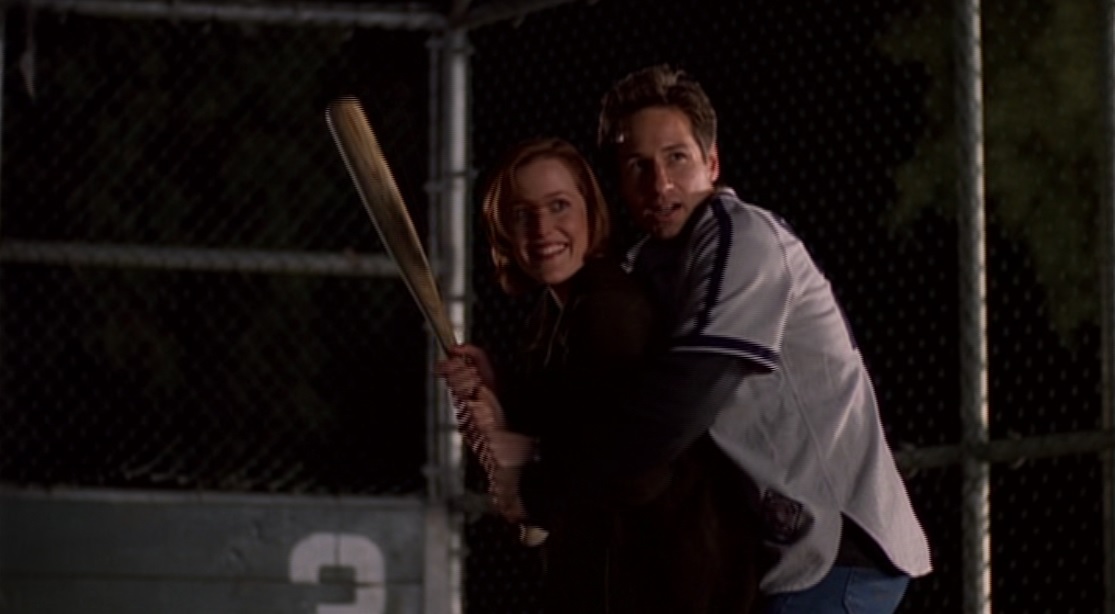
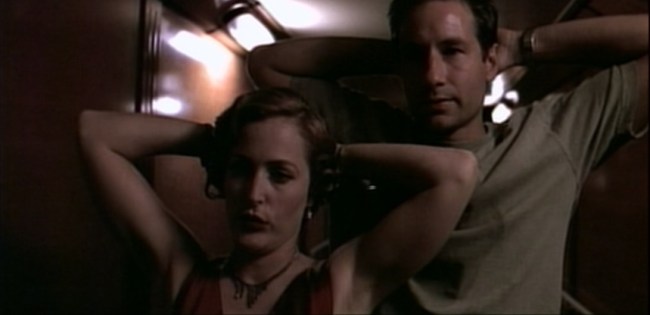
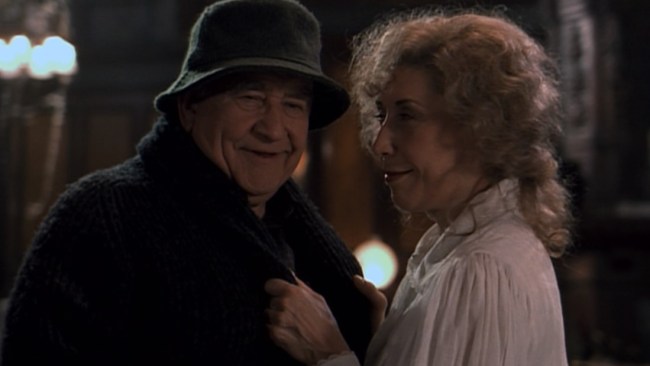
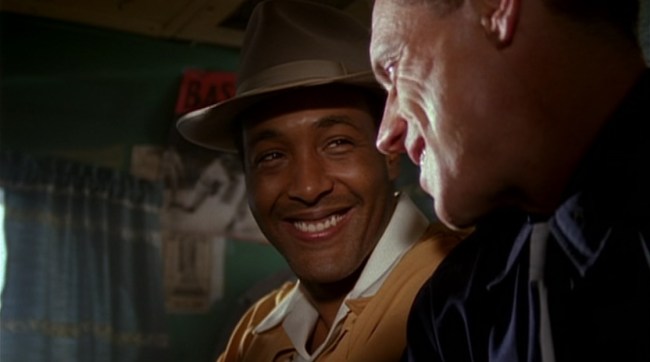
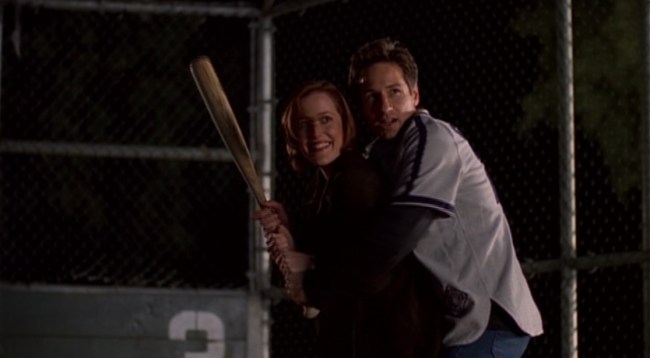
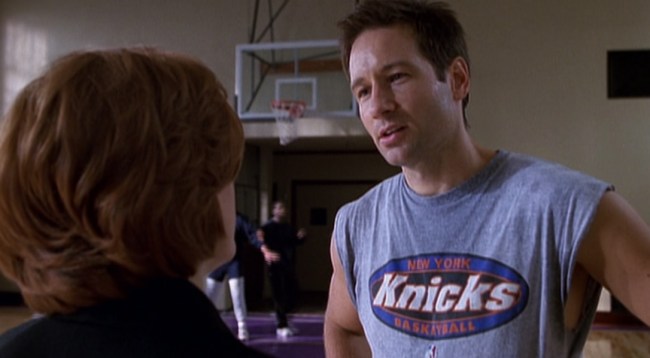





Published: Jun 20, 2016 06:50 pm